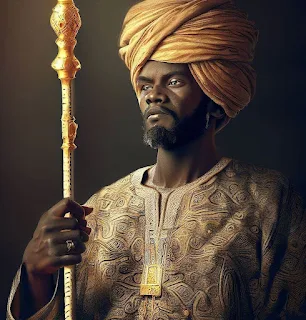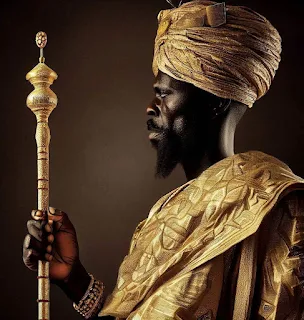Mansa Musa the 500 Billon Dollar CEO
The Leadership of Mansa Musa and the Mali Empire in today’s wealth would equal around $500 Billion Dollars
The African kingdom of the Mali Empire, which reached its height during the 14th century, stood as a formidable entity comparable in size to the Roman Empire but richer and culturally and intellectually keener.
Situated in the vibrant landscape of West Africa, the Mali Empire extended its reach across an expansive territory, encompassing regions that now form parts of modern-day Mali, Senegal, Gambia, Guinea, Niger, Mauritania, and Burkina Faso.
Envision being the head of a corporation valued at $500 billion, tasked with safeguarding the cultural and financial prosperity of its people. Mansa Musa excelled at his job and furthered the reign of the Mali empire.
 |
| Mansa Musa |
Mansa Musa the Richest Man Who Ever Lived
Turning our gaze to the richest man who ever lived in history in history, Mansa Musa, we uncover in paralleled narratives of impactful leadership that shaped the destiny of millions. Through his leadership the Mali empire wealth was unparalleled because of the trade of gold and salt.
Yes salt. Salt was crucial to the Mali Empire's wealth because it was a vital commodity used for preserving food, seasoning, and trade, making it highly sought after and valuable. The illustrious Mansa Musa, the 10th reigning leader of Mali Empire Used gold and salt to build a nation worth over $500 billion in today’s market and this wealth belonged to one man, Mansa Musa, Mansa means sultan or ruler.
Exploring the Legacy of Mansa Mua on a Deeper Level
How did Mansa Musa Look
Mansa Musa was known to wear richly embroidered robes, often made from luxurious fabrics such as silk and brocade. These garments were often adorned with gold and intricate designs, reflecting his immense wealth and the opulence of his reign.
One particularly famous description of Mansa Musa comes from the writings of Arab traveler Ibn Battuta, who visited Mali during his pilgrimage to Mecca. Ibn Battuta remarked that Mansa Musa wore a turban and a gold-embroidered tunic with a gold scepter in his hand. He also noted the lavish procession that accompanied Mansa Musa during his pilgrimage, which included a multitude of attendants, soldiers, and camels carrying gold.
Mansa Musa and the Political Achievements of the Mali Empire
The Mali Empire was a well-organized, centralized state with a strong political structure. It was ruled by a series of powerful kings, including Mansa Musa, one of the wealthiest individuals in history. Mansa Musa was a remarkable figure who played a pivotal role in the Mali Empire's history. Imagine a ruler with vast power, immense wealth, and a deep commitment to his people. This ruler, Mansa Musa, symbolizes the empire's greatness and the heights of African civilization.
Mansa Musa ascended to the throne around 1312, becoming the emperor of the Mali Empire. His reign marked a period of significant expansion and cultural flourishing. He inherited a realm that spanned vast territories, encompassing parts of modern-day Mali, Senegal, Gambia, Guinea, Niger, and more.
What truly sets Mansa Musa apart is his immense wealth. He is often regarded as one of the wealthiest individuals in history. His empire's economic strength, driven by its control over key trade routes and valuable resources like gold and salt, fueled his legendary riches. It is said that Mansa Musa's pilgrimage to Mecca in 1324, a journey of great spiritual importance for Muslims, turned into an awe-inspiring display of his empire's prosperity.
Mansa Musa embarked on a remarkable pilgrimage to the holy city of Mecca, a journey that showcased not only his devoutness but also his empire's splendor. He traveled with a vast caravan with thousands of attendants and camels laden with gold, gifts, and exquisite goods. His extravagant displays of generosity along the way left a lasting impression on the people he encountered.
Cultural Achievements of the Mali Empire
The Mali Empire's rich cultural heritage is at the heart of this legacy. Its cities, particularly the legendary Timbuktu, flourished as centers of intellectual exchange and artistic expression. Scholars, philosophers, and thinkers from far and wide converged in these vibrant hubs, engendering a flourishing of knowledge and creativity.
The manuscripts produced during this era encompassed a wide spectrum of disciplines, from astronomy to law, illuminating the empire's intellectual prowess. This legacy of scholarly achievement enriched the African continent and contributed to the broader advancement of human understanding.
In the realm of art and culture, the Mali Empire's influence is palpable. Its architectural marvels, including mosques and palaces, are a testament to the empire's artistic sophistication and aesthetic sensibilities. These creations continue to captivate the imagination and inspire contemporary artists, connecting modern generations to the empire's creative legacy.
Mali Empire Economic Prosperity
Economically, the Mali Empire's prowess in trade remains a beacon of inspiration. Its strategic location along key trans-Saharan trade routes facilitated the exchange of goods and ideas across vast distances. The empire's mastery over coveted resources like gold and salt propelled its economic prosperity, enhancing its influence in global trade networks.
The Mali Empire's commercial acumen set the stage for future African economies, fostering a tradition of trade and entrepreneurship that would continue to shape the continent's interactions with the world.
Furthermore, the Mali Empire's legacy extends to its adept governance and political achievements. The well-organized administrative structure and rule of law established by the empire were a model for subsequent societies.
Its emphasis on just governance, protection of subjects, and maintenance of stability left an enduring blueprint for effective leadership. This legacy of responsible governance resonates in the aspirations of modern African nations, echoing the empire's commitment to the welfare of its citizens.
The Mali Empire's legacy is not confined to the pages of history.
Mansa Musa may have been the financial, cultural and political as well as religious leader of the Mali empire whose wealth is estimated at $500 billion in today’s market terms however the wealth of the empire was actually limitless.
Today’s leaders can take lessons from Mansa Musa in terms of Mansa Musa attracting the greatest thinkers and artist in the world to the Mali empire because of his brilliant marketing campaign on his trip to Mecca. He may have been the richest man who ever lived due to the trade of gold and salt however his brilliant mind will be remembered through the annals of history.
The Mali Empire's legacy is not confined to the pages of history but lives on in the vitality of subsequent African civilizations. Its cultural achievements, economic ingenuity, political wisdom, and artistic prowess collectively form a legacy that continues to mold the course of African history and global interactions.
As societies build upon the foundation laid by the Mali Empire, its enduring influence serves as a reminder of the remarkable heights that African civilizations can achieve.
 |
| Mali Empire |





